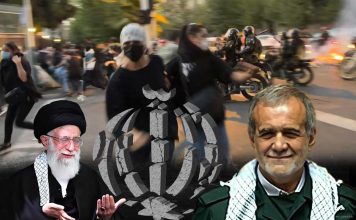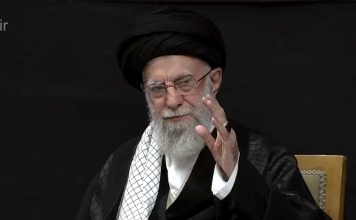[The following interview was conducted in Cairo, Egypt earlier this month on the occasion of the anniversary of the passing of Mohammad Reza Shah Pahlavi. It was first published in the Italian daily Libero and has been republished with the author’s permission.]
By Mariofilippo Brambilla di Carpiano ©
Your Majesty, 42 years have passed since the death of Shah Mohammed Reza Pahlavi, once both equally loved and detested by his people. His figure remains strongly present in the Persian community and seems to be regaining a sort of posthumous popularity. What remains of his human and political story?
What strikes me most is that after many years, and after all that was said against us, many of those who opposed us at the time, including some foreign politicians who were in total disagreement with the progress and development of Iran, understand how much the Shah really did for our country. And the most important thing is that Iranians born after 1979 learn about all this. On their part there is a growing feeling of fondness and love, and in the last months in Iran there have been numerous rallies where they chanted in loud voices: ‘Reza Shah roohat shad’ (which literally means: Reza Shah, may your soul be happy). With regards to your question, the Shah is loved by the people and hated by various political groups and opinion makers. But what moves me and my family today is the fondness that the Iranian youth have towards the memory of the Shah. We receive so many displays of affection from those who fought against us in the past but who now, all things considered, regret having carried out that revolution.
Following the vision inherited by his father Reza Shah, your husband pushed Iran in the race towards modernity and thanks to the immense revenues from the sale of oil, the country passed from the Middle Ages to the contemporary developed world in just two generations. Is it true that at the end of his reign he would have liked to open the way to a more liberal regime?
Yes, it’s true. Think about what Iran was like, when it was still known as Persia, when Reza Shah rose to power in 1925 and what it was like when we left in 1979. Imagine the progress that took place in all areas: socially, in industry, in healthcare, education and development. The country was projected forward in all these sectors. What an increasing number of Iranians are now realizing over the years, is that the Shah intended to open up domestic politics in a more liberal sort of way as soon as growth and development were consolidated, giving the new generations time to be educated to live in a modern society. In the mid-1980s, the Shah had planned to leave the crown to our son Reza (the crown Prince) to complete the transition towards a fully constitutional monarchy.
Prince #RezaPahlavi (@PahlaviReza) Issues Statement on the Anniversary of the 1906 Constitutional Revolution in #Iran https://t.co/XGYaZN1fgC
— Kayhan Life (@KayhanLife) August 6, 2022
[aesop_image img=”https://kayhanlife.com/wp-content/uploads/2022/08/2010-08-26T000000Z_421178968_MT1ABCPR241640092_RTRMADP_3_ABACA-PRESS-1.jpg” panorama=”off” align=”center” lightbox=”off” captionsrc=”custom” caption=”Empress Farah Pahlavi of Iran. REUTERS./” captionposition=”left” revealfx=”off” overlay_revealfx=”off”]
The unforgettable celebrations of Persepolis’s two thousand year anniversary and the 2500 years of the Persian monarchy drew strong criticism towards the Shah for having used huge amounts of public funds. What were his, and his government’s objectives in that circumstance?
He wanted to show the history of Iran, the culture of Iran and how this country is made up of great civilizations, to the Iranian people and to the whole world. Virtually all heads of state from all over the world came to Persepolis for the celebrations. Unfortunately, at that time, a number of international media were against us as well as part of the public opinion, so they wasted no time in criticizing anything we did. Since the present situation in Iran has drastically degenerated to the point that it is no longer comparable with that during the Shah’s regime, I wonder….why is it that in all these years not one of them has criticized those in power in Iran today, in other words, the Islamic Republic? At that time there were a set of foreign interests against us which were linked to the high oil prices.
Did the 2500-year anniversary of Persepolis give a boost to the national economy?
Iran became equipped with many new infrastructures which are still there at present. Highways, airports and hundreds of schools and hospitals were built. Workers had a salary with which they could feed their families, students had food in schools and women held important roles in state administration. Of course, we also had many internal problems, ours was a developing country which also had its contradictions. But everything was done for the benefit of the population, while today, unfortunately, the majority of the Iranian population is in a condition of extreme poverty. Women are mistreated, there are revolts among workers and school teachers. There are even some parents who sell their children as a result of the poverty they face. Think of how stable and prosperous Iran was once and what situation it is in today with the current regime. More than a few now realize how much good was done in the times of the Pahlavi.
Persepolis Celebrations Are Focus of New Book by UCLA’s Robert Steele
An Outstanding Iranian Statesman: Remembering Mr. Abdolreza Ansari
Many Iranians from all over the world come to Cairo to pay homage to the tomb of the last Shah who is buried at the royal Al Rifa’hi Mosque which is also the resting place of King Farouk of Egypt. There’s a saying in Farsi which says: ‘In the King’s land, the King never dies.’ History is full of nemeses. Could this be a sign of a possible change in Iran?
Yes, because the majority of Iranians, both inside and outside the borders, don’t want this theocratic regime and among them are many young people who are in favour of the monarchy.
Since the beginning of the 1950s, Shah Mohammed Reza built strong bilateral ties with Italy. The friendship with Enrico Mattei, Eni’s president, supported the oil agreement that changed the world fuel market.
When there was a problem at some point and the whole world stopped buying our oil, Enrico Mattei decided to keep buying it and broke all the rules imposed by the major companies. Mattei later lost his life in a plane crash. Everyone thought that someone had wanted to get rid of him following the agreements reached with Iran. Oil has always been the cause of our fortunes as well as our misfortunes.
You have always maintained strong ties with the Italian cultural panorama…
I admire Italy and the Italians. Italy is a great country of culture and civilizations and we used to have many cultural relations beyond the political and commercial ones. There were many Italian professors who would come to Iran to repair and restore ancient monuments. And there are Italian Iranologists who speak Persian better than me!
How do you feel when you return to the Egyptian capital?
When I come back here I feel like I am in my second home and I am grateful to the Egyptian government and people who always receive us with great friendship and kindness. When we first time came here at the beginning of our exile, the foreign journalists asked the population if they had any negative opinions of us. But on the contrary, the general public replied that the Shah was welcome because he had helped them when Egypt had problems.
Iran is probably the most cultured country in the Middle East. During the monarchy, its commitment to the creation of a large contemporary art museum, the first to be inaugurated in a Muslim country, is well known. What hopes remain of reopening this enormous collection to the public?
When I created this museum, I said to myself: in the world there are so many Persian masterpieces, why not have some from other countries too? We couldn’t afford to buy ancient works so we thought about buying contemporary artwork. Back then, at the beginning of the 70s, prices for these works were not as high as they are today. Following the revolution the museum was closed and I feared that the masterpieces would be destroyed or sold. Luckily almost all of the pieces were sheltered underground because they were considered incompatible with Islamic morals. Only one painting was exchanged through a corruption ring. I am in touch with many young Iranians who often write to me about our museum.
As Empress consort the Shah had delegated the cultural policies of the country entirely to you. Not only contemporary art but also archaeological excavations, the carpet museum, the Shiraz festival and many other events. Which project thrilled you the most?
Certainly the Shiraz Festival which brought together great artists from all over the world and which saw the most diverse traditional and avant-garde artistic expressions from East and West, from Japan to China, from Europe to Africa. Coming from a country of great civilization, I have always been very interested in art and culture.
I also recall the Carpet Museum as well as the Golestan museum with collections from the Qajar Dynasty. Unfortunately, one of the museums was later used to house the revolutionary guards.
But I didn’t just deal with art, I put a lot of care in my social activities for women, for the sick and the lepers. With the help of my compatriots, especially women, we managed to complete many projects in the social and humanitarian fields.
In your life there has been no lack of great splendors and terrible tragedies, where do you find the strength to resist the blows of fate?
The misfortune of having lost my daughter Leila and then my son Ali-Reza represents an infinite sadness. I told myself that I have to keep myself together for my living children, my granddaughters and for those compatriots of mine who lost their children to this regime in Iran. I try to be positive, I thank heaven for all the good things there are and I try never to be negative in my life.
The President of the Arab Republic of Egypt, Anwar El Sadat, is also commemorated today in Cairo. He was the only Head of State at that time to give safe asylum to the Shah and his family following the Iranian revolution. What are your memories?
My family and I are very grateful to Egypt and to President Sadat and Mrs. Sadat because when the most powerful country in the world (the United States) was our friend, and when it didn’t want to grant us asylum, the only one who had the courage to host us was President Sadat. He had the humanity to host the sick Shah and to guarantee our safety. The United States didn’t want Egypt to accept us and President Sadat told American President Carter: ‘Jimmy, I want the Shah here and alive.’ At one point he decided he would no longer speak to President Carter so he sent his deputy Mubarak to do so. Also, when we were at the Bahamas at the mercy of events, Sadat wanted to send us an Egyptian airplane to fly us to Cairo but the Americans refused and offered us one of their planes. We paid dearly for that plane and while we were travelling over the ocean the pilots suddenly landed in the Azores. They told us that they were waiting for a fly permit, right in the middle of the route…. The truth is that the United States were negotiating with the revolutionary government in Iran in order to hand us over to them. Luckily there were the Nowruz holidays at that time (the Persian New Year), had left the capital and fortunately unavailable. They could not decide.
In 1978/79, the code words of the revolutionaries imparted by Khomeini were recorded on audio tapes and then listened to in secret in the apparent calm of the Mosques. Today, the protests against the regime of the Ayatollahs travel on social networks. What do you think of social media and how do you communicate through it?
It is very important because thanks to social networks, Iranians are kept informed of many things. I use them and I am very often in contact with my compatriots through social media. I write, I record vocal messages, I sometimes speak with my fellow countrymen and I thoroughly enjoy talking to all those young people born after the Islamic revolution. All of this instills a lot of courage in me. It can be said that in modern Iranian society there has long been a strong propensity for the use of technology.
Iranian Political Prisoners Issue Statement in Support of Prince Reza Pahlavi
Your son Prince Reza, is recognized by many Iranians living in the country and by the majority of the Persian diaspora in the world, as the leader of the opposition to the fundamentalist Islamic regime in Tehran. According to some independent international observers, he could be the person capable of bringing civil liberties to Iran and of preserving the integrity of the national territory. What are his objectives?
What my son Reza has always said in all these years is to believe in defending the integrity of Iran, the freedom of politics, women’s freedom and the separation of religion from the State. He wants the Iranians to have the freedom to choose what their future political and institutional structure should be.
You care very much about your exiled family living in the United States and in Europe. Your granddaughters Noor, Iman, Farah and little Iryana are young modern day girls. Do you tell them about the history of their country and that of their grandfather?
Iryina is still a little small but I certainly speak to all of them about our history. I should do it more. They have read my book of memoirs and that of their grandfather. They are very busy with their lives as girls but I always try to encourage them.
In Iran, in recent weeks, new protests have erupted on the condition of women and in particular against the obligation to wear the hijab (the Islamic veil). The Pahlavi started women’s emancipation in the country. Is your granddaughter Princess Noor, eldest daughter of Prince Reza, the heir to the dynasty?
Yes, according to the primogeniture principle. If there were a monarchy in Iran, Noor would succeed her father. Our old constitution acknowledged women in important positions.
My appointment as regent by the Late Shah was to emphasize the importance of women, in a Muslim country in the Middle East. Yes, according to the primogeniture principle. If there were the Noor monarchy in Iran, she would succeed to her father. Our old constitution acknowledged women in important positions. When the Shah appointed me as a ruler it was to give importance the female role, in a Muslim country in the Middle East.
The vast majority of Iran’s population is under thirty years old. A generation which has not experienced the Shah’s reign or the years of Ayatollah Khomeini but which is living through the current crisis of the Islamic Republic. How do you envisage their future?
I would like to remain positive, as I always say. I am sure that that one-day light will win over darkness and that Iran will rise from its ashes.
If conditions allowed, would you be willing to go back to your country at any time?
Yes, I hope so, but the most important thing for me is the freedom of Iran and the freedom of the Iranian people. If one day I were able to return to my country, that day would be one of immense joy for me.





